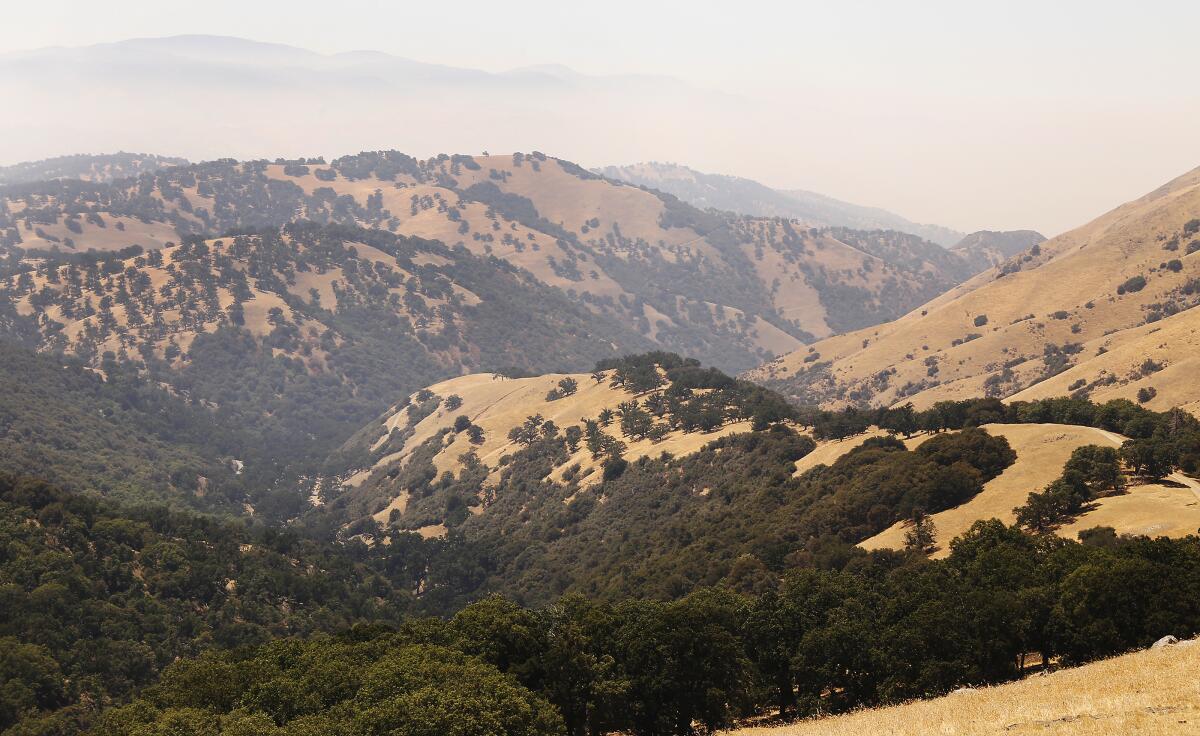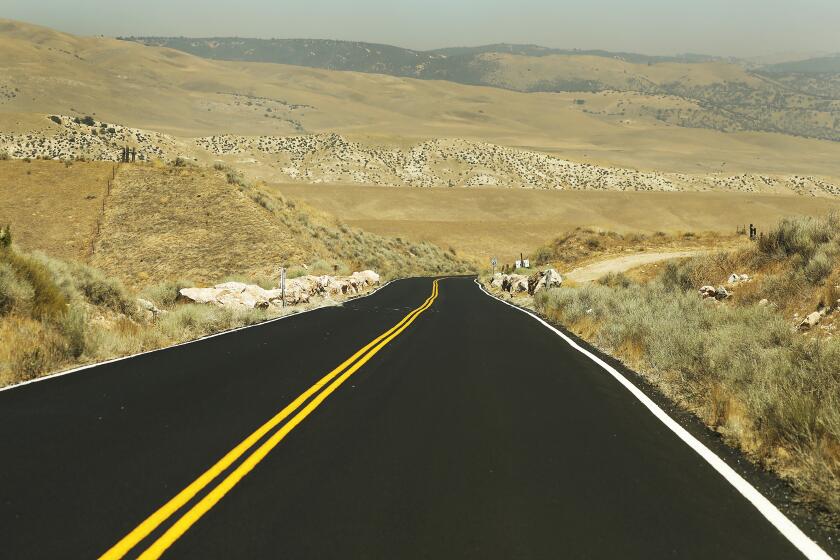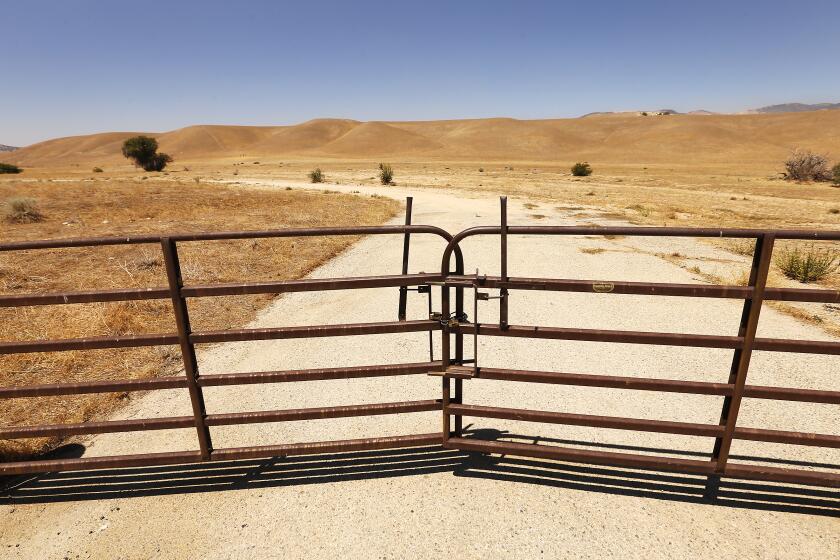Environmental group and Tejon Ranch agree on plan to build 19,300 zero-emission homes

- Share via
One of Southern California’s longest running development battles ended after two decades Wednesday when an environmental group agreed to the construction of a massive “net-zero” greenhouse gas community of 19,300 homes just off Interstate 5 on the southern flanks of the Tehachapi Mountains.
The pact between the Tejon Ranch Co. and the nonprofit Climate Resolve comes amid a severe housing crunch across California and removes perhaps the largest roadblock remaining for the 6,700-acre Centennial project bordering Kern County, about 70 miles north of Los Angeles. The project had been stalled repeatedly by environmental and economic challenges, even as other large developments won approval in one of the last undeveloped sections of Los Angeles County.
The proposal had won final certification two years ago from the L.A. County Board of Supervisors, and the company declared that it had been vindicated. But earlier this year, Superior Court Judge Mitchell Beckloff rejected the county’s approval of the developer’s environmental impact report, effectively blocking construction.
Specifically, the judge cited aspects of the environmental review concerning wildfire risk and additional greenhouse gases generated by vehicles. Under terms of the deal expected to be presented to Beckloff later Wednesday, Climate Resolve has agreed to dismiss its legal claim that L.A. County violated the California Environmental Quality Act when it approved Centennial in 2019. The new development, which will not include natural gas hookups, would be designed specifically to combat global warming, the parties said.
The agreement calls for the installation of nearly 30,000 electric vehicle chargers at residences and commercial businesses. In addition, the plan will include other incentives to support the purchase of 10,500 electric vehicles, school buses and trucks.
Centennial’s original plans required that all residential units and a percentage of commercial buildings be powered by solar energy.
A judge rejects approval of Tejon Ranch project’s environmental impact report by Los Angeles County, effectively blocking construction.
The compromise also requires funding for fire protection and prevention measures, including fire-resilient planning and vegetation management strategies that would also benefit neighboring communities. It also directs the creation of an organization empowered to produce annual progress reports.
“We’re proud of this agreement — it took a lot to hang in there and get it done,” said Bryn Lindblad, deputy director of Climate Resolve. “Now, we’re hoping that it gets people excited about being part of a net-zero carbon community north of downtown.”
Barry Zoeller, spokesman for Tejon Ranch, said some of the costs for the additions to the normal infrastructure for such a project “will have to be passed on to the customer, otherwise it doesn’t make the community economically viable.”
For two decades, Tejon Ranch has pursued development of the proposed community of 57,000 people and 10.1 million square feet of commercial and industrial space.
Environmentalists sue Tejon Ranch Co., claiming it is improperly withholding funds needed to oversee the conservation of protected lands.
With that goal in mind, the company brokered an agreement with several major environmental organizations in 2008 to conserve 240,000 acres of undeveloped mountains, grasslands and twisted oaks that are home to such species as California condors and mountain lions. In exchange, the groups agreed not to oppose the company’s development plans.
Beckloff’s ruling earlier this year found that the company’s environmental review failed to buttress its conclusion that the project would not significantly increase the risk of wildfires in a region prone to them. Although the judge found the developer’s on-site analysis to be “sufficient,” he found discussion of surrounding off-site impacts, such as wind-driven embers, to be “problematic.”
Proposals to suck lithium from the brine of geothermal operations at the Salton Sea have raised hopes of new jobs and environmental improvement.
The ruling denied 20 of the 23 claims raised in separate lawsuits filed against Tejon Ranch Co. under the California Environmental Quality Act by Climate Resolve, the Center for Biological Diversity and the California Native Plant Society.
The plaintiffs were not among the original coalition of environmental groups who agreed to set aside legal action in exchange for land preservation.
Beckloff dismissed all the claims raised by the center and the Native Plant Society.
In an epic search for territory and mates, the gray wolf from Oregon had ventured hundreds of miles to the very edge of Southern California’s crowded suburbs.
But the prevailing issues in Climate Resolve’s lawsuit were rare wins among more than a dozen legal actions filed against Tejon Ranch Co. since 2003 to delay or block development on the remaining 30,000 acres of its holdings.
In addition to Centennial, the company’s proposed developments include Grapevine, a master-planned community in southern Kern County, and Mountain Village, which would include spas, boutique hotels, commercial space and estate homes in southern Kern County.
If approved by Beckloff, Centennial will join the massive Newhall Ranch project in northern Los Angeles County as the most environmentally friendly suburban developments ever planned in California.
After negotiations with environmental groups, the developer of the 21,500-home Newhall Ranch project committed to provide $25 million for conservation efforts. That project also will include 10,000 solar installations and electric vehicle recharging stations in every home, plus more in the surrounding community.
“More than ever, the state desperately needs the 19,333 housing units Centennial will provide, including nearly 3,500 affordable units,” said Gregory Bielli, president and chief executive of Tejon Ranch Co. “At the same time, California needs to achieve its climate goals.”
More to Read
Your guide to our clean energy future
Get our Boiling Point newsletter for the latest on the power sector, water wars and more — and what they mean for California.
You may occasionally receive promotional content from the Los Angeles Times.


















